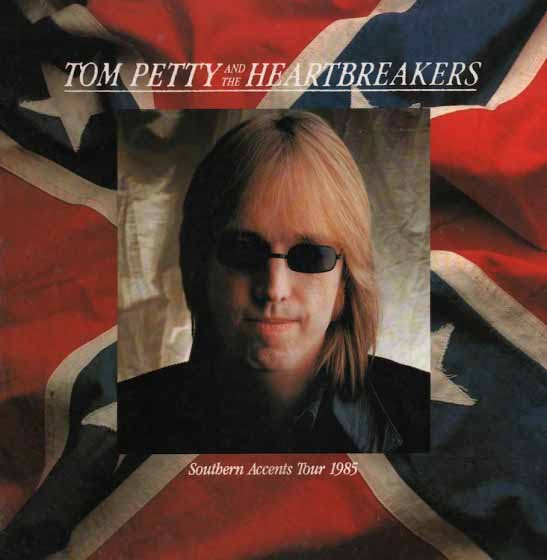Anyone remember how CDs are indestructible? How about the scene in Back to the Future 2 where Marty’s in an alley and there’s the huge stacks of old CDs waiting to be junked? Anyone remember portable turntables? Not the kiddie close-n-play kind, the name-brand ones that cost $200. Listen to your LPs in the car! On the beach! Take ’em to the office! (“Did you bring ‘Master of Reality’? Biiitchin’, crank it.”) Absurd, right?
Anyone remember those 8-track players shaped like a big apple? Or the TNT detonator ones with the handle you could push down on? KABOOM! Anyone remember Quad? I don’t, but my stepdad’s 1975 Fisher Quadrophonic receiver is one of the finest pieces of stereo equipment I’ve ever seen and yes, it still works. That thing freakin’ rocks, it weighs like 35 pounds.
Anyone remember how DAT was going to be the greatest development ever and then it just sort of disappeared?
A while back, I wrote a semi-satirical article on the joys of downloading and the invisible ethics of the music industry, which the fine semi-subversive website you are now eyeballing saw fit to print. Since then, I’ve received some feedback on the subject from sources as diverse as: fellow high school music nerds I haven’t seen in over 20 years (“…why do you want to rip off Rush? Those guys are cool!”), vague acquaintances drunkenly slinging a viselike arm around my shoulders at various downtown drinking establishments, as well as random obscenities hollered on the street by total strangers. So, I’ve decided to follow up on several points, as well as touch upon some peripheral subjects, in a fun Q & A format. Whee. Here goes:
Q: Isn’t file-sharing just like theft? Don’t you WANT to give Rush money to show your gratitude for the awesome music they make?
A: 70-80% of what I download is music I already own or have owned, either in LP, cassette, or CD form. I bought all of Rush’s albums years ago, and several again on CD. That music’s been paid for, some of it twice. How many times does the record industry want me to cough up more dollars for stuff I have already? (Answer: How many new formats can they think up?)
Q: Don’t bands benefit from signing with major labels due to promotion, distribution, etc.?
A: It depends on what you want to achieve. If you want your band/self to be a household name, recognizable to Main Street U.S.A. like John Mayer or Vanilla Ice, majors are probably the way to go, if you can play the game. They will deposit your music in Wal-Marts from Idaho to Nebraska (once all your filthy potty-mouth language and heretical ideas have been neutralized) and get your ugly mug on Jimmy Kimmel’s show as well. Some indie labels can do this stuff too, just not as often.
Maybe you can even play on one of those MTV spring break shows (do they still exist?) in front of a giant Coors banner. Remember at the end of the day, all the promo posters, free CDs, record release parties, crazy Vegas coke binges with expensive hookers, new gear and automobiles, manufacturing and shipping costs etc. is being charged to YOU. It all comes out of your sales, thanks to the magic little word “recoupable”. The label just fronts you the cash, they expect to get repaid for all this junk. And if the record stiffs, guess where the money comes from? That’s right, your ass.
Q: Your comment about record labels taking a cut of bands’ touring profits, is that for real?
A: Yes. Back in the day, labels were only concerned with record sales, any money made on tour was gravy for the bands. It usually wasn’t much, but a new industry sprung up surrounding the manufacture and sale of t-shirts, posters, bumper stickers, etc. with bands’ logos and/or faces on them. For the most part, this was money the labels couldn’t touch, since none of the products infringed upon the actual copyrighted music contained on the albums.
This is how a band like Wilco, within five years of their existence, could be pulling down a million dollars a year on tour while their records weren’t selling jack diddley and you never heard them on the radio. They built their fan base through live shows and word of mouth. Problem was, the band was making all the money, not their label, and they were soon dropped.
With the advent of downloading, record sales fell sharply and the music industry started sniffing around for other ways to make a profit off of those it had under contract. In the last five years, the tour percentage clause has become standard in most deals struck with new acts, who accept it as another stepping stone to stardom.
One article I read centered on the group Paramore, a young nondescript band with a female singer, who would still be playing nightclubs and campuses for peanuts, had it not been for the major label push. Paramore was one of the first acts signed with the new clause in place, and the band couldn’t be happier. Right now, they’re too stoked over hearing their songs on the radio and seeing themselves on TV to worry about money they aren’t making. Till the hits dry up, of course. Then it’s too late.
Q: Doesn’t downloading sound the death knell for record stores?
A: Yes and no. The big chain stores have market analysts who spotted the trend years ago and advised them to pull out before they started losing too much money. Even I was shocked when Tower Records closed its doors. I never shopped there, but I kind of thought it was one of those places that would always be around, like McDonald’s.
So, having the big boys out of the way is beneficial for independent mom-and-pop stores, who are free to mark up their stock as high as they want, now that most of their competition is gone. And people still like to go shopping, that hasn’t changed.
Oddly enough, digitizing music has caused a resurgence in popularity of the format it was meant to replace, the 12″ long-playing disc. You can download thousands upon thousands of CDs, both legal and non-, but you can’t download a record album, you need the actual artifact, and this requires buying it from somewhere.
Raising the sticker price of LPs above that of CDs was a masterstroke. Whatever corporate toady thought up that one deserves a fat raise. He’s got vision. The industry is happy you’re still buying what they’re selling. They don’t care what shape it comes in, as long as they can keep jacking the price up every five years or so.
Q: You still listen to cassettes? What’s the point in that?
A: Why not, I’ve got HUNDREDS of ’em! They still sound fine, and I’m not going to get rid of them just because a bunch of fat cats decided it was a dead format. I have a suspicion that the very public “Death of the LP” malarkey from 20 years ago was a smokescreen for what the industry really wanted killed: recordable cassette tapes. Small, portable, decent sound, you can fit close to two hours on ’em … and if they break, there’s a pretty simple mechanism inside that’s easy to fix. How the hell do you fix a CD? Answer: You don’t. You just throw it away and buy another. And another. And another.
Keep in mind why CDs were forced into being the industry standard over LPs: at that point in time, YOU COULDN’T DUPLICATE THEM. You had to understand digital encoding, and the only manufacturing plants were in Germany and Japan. Nowadays it takes less than a minute to make a perfect digital copy of a compact disc, and the music business sees this as lost revenue.
But the problem has gone beyond that: more and more consumers are storing their fave jams on hard drives and portable MP3 players. The music itself is just data, it’s invisible. There’s no longer any need for a delivery agent, a thing you can hold in your hand like a CD or tape that costs money.
The industry’s PRODUCT has been eliminated; it’s a marketer’s worst nightmare. They’re trying to sell you something intangible, something only your ears can pick up. Sure, they still want you to pay for music through iTunes and such, but why bother when you can go to any number of websites (or a friend) and get it for free?
You can bet that right now, someone somewhere is trying to figure out a way to charge you every time you LISTEN to a song they own, whether or not you’ve legally paid for it. The next time your neighbors or roommates complain about the volume of your stereo, tell ’em you’re saving them hundreds of dollars.
The entertainment industry has traditionally dragged its feet and tried to block any technological developments that have been beneficial to consumers, usually by virtue of affordability. Cassettes. DAT. Burnable CDs. I-Pods (Read up on the VHS vs. BETA wars for more tales of the customer getting screwed). All they have to do is lay on the guilt by calling it theft and people will roll over. I’m an American, I don’t steal. I do what my daddy did: pay for everything through the nose.
They have famous mouthpieces like Metallica’s Lars Ulrich or Gene Simmons of KISS, who said in a recent interview that anyone who downloads music should go to jail because he needs that money to take care of his wife and kids. Never mind the fact that his wife spends $40,000 to have her hair and nails done and his kids get Hummers for birthday presents. And they have their own TV show.
The music business dug its own grave. If they had just kept prices low … but no, they’ve been at it too long, no one’s about to take a salary cut even if this ship is sinking faster than the Titanic. All that shameless greed is finally catching up with them. They’ve never been a friend to the consumer and we don’t care if they lose their cushy jobs.
Ha ha. Kiss my lily-white ass, you fuckwads. This aint 1979, but twenty bucks is still a lot of money for some of us.
 When she first came around, I was vaguely attracted to her, I don’t know why. Actually, I do know why: she had long red hair, and I’m a sucker for that stuff. Other than that, not really my type. Too thin. She was also a bit nutty, but that never stopped me before.
When she first came around, I was vaguely attracted to her, I don’t know why. Actually, I do know why: she had long red hair, and I’m a sucker for that stuff. Other than that, not really my type. Too thin. She was also a bit nutty, but that never stopped me before.




